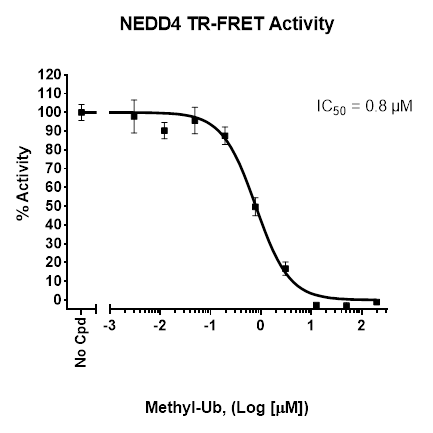NEDD4 intrachain TR-FRET Assay Kit
The NEDD4 intrachain TR-FRET Assay Kit is a sensitive high-throughput screening (HTS) TR-FRET Assay Kit, designed to measure NEDD4 auto-ubiquitination activity in a homogeneous 384 reaction format. It utilizes a Europium-labeled ubiquitin (Ub) donor as well as Cy5-labeled Ub acceptor to complete the TR-FRET pairing. Since both the TR-FRET donor and acceptor are incorporated into poly-ubiquitin chains formed on NEDD4, this assay measures poly-ubiquitination. As a homogeneous assay, it requires no time-consuming washing steps, making it especially suitable for HTS applications as well as real-time analyses.

Figure 1. E3 ligase NEDD4 intrachain TR-FRET Assay Kit schematic.
Need us to run inhibitor screens or profile your compounds against NEDD4? Check out our Ubiquitination Screening Services.
- Fluorescent microplate reader capable of measuring Time Resolved Fluorescence Resonance Energy Transfer (TR-FRET)
- Adjustable micropipettor and sterile tips
- Rotating or rocker platform
| Catalog # | Name | Amount | Storage | |
| 80301 | UBE1 (UBA1), FLAG-tag* | 50 µg | -80°C | Avoid multiple freeze/ thaw cycles! |
| 80314 | UbcH5b, His-Tag* | 300 µg | -80°C | |
| 80404 | NEDD4, FLAG-tag* | 2 x 20 µg | -80°C | |
| 78307 | Ubiquitin Mix (200x) | 50 µl | -80°C | |
| ATP (4 mM) | 2 x 1 ml | -80°C | ||
| U1 assay buffer | 2 x 10 ml | -80°C | ||
| White, nonbinding, low volume microtiter plate | Room Temp | |||
*The initial concentration of enzyme is lot-specific and will be indicated on the tube containing the protein.
The Ubiquitin Mix is sourced from South Bay Bio LLC.
Covalent conjugation to ubiquitin (Ub) is one of the major post-translational modifications that regulates protein stability, function, and localization. Ubiquitination is the concerted action of three enzymes: a Ub-activating enzyme (E1), a Ub-conjugating enzyme (E2), and a Ub ligase (E3). The specificity and efficiency of ubiquitination are largely determined by the E3 enzyme, which directs the last step of the Ub-conjugating cascade by binding to both an E2∼Ub conjugate and a substrate protein. This step ensures the transfer of Ub from E2∼Ub to the substrate, leading to its mono- or poly-ubiquitination.
NEDD4 (neural precursor cell expressed developmentally down-regulated protein 4) is an E3 ligase, member of the HECT (Homologous to the E6-AP carboxyl terminus) ubiquitin ligase family which target client proteins to the proteasome system for degradation. The protein contains an N-terminal calcium and phospholipid-binding C2 domain, three tryptophan-rich WW domains (that bind to proline-rich peptide motifs), and a C-terminal HECT catalytic domain.
NEDD4 regulates the expression levels of various receptor tyrosine kinases, notably growth factor receptors IGF1R (Insulin-like growth factor 1 receptor), FGFR1 (fibroblast growth factor receptor 1), EGFR (Epidermal growth factor receptor), and VEGFR2 (Vascular endothelial growth factor receptor 2), thereby playing a role in growth factor signaling and regulating cell proliferation. The E3 ligase also controls the expression levels of ion channels and is part of a signaling complex involved in dendrite extension and neuron architecture. It is an essential protein during development, including neural development. NEDD4 is a potential therapeutic target for the treatment of various types of cancer, cardiovascular disease, and neuro-degenerative diseases such as Parkinson's disease, Alzheimer's disease or Amyotrophic Lateral Sclerosis.


